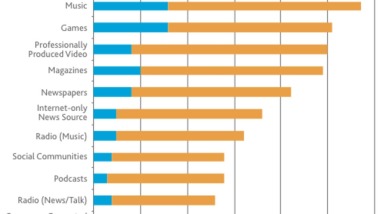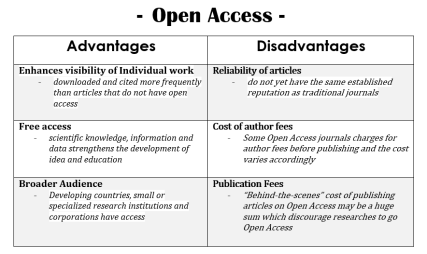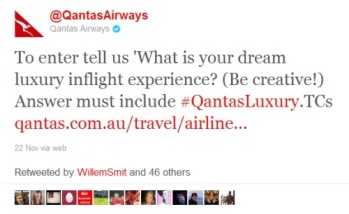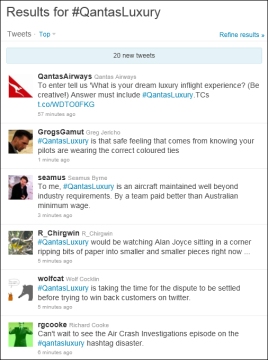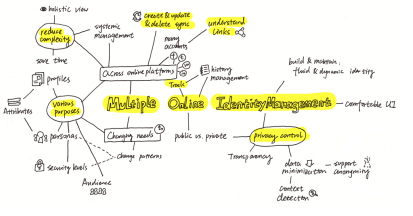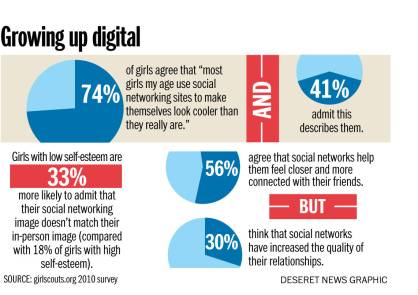Yes, I’ve took up the challenge (comments in my google doc) to make a video. The following video I’ve made, is to summarize my views/thoughts before and after this module. Enjoy! (Sorry it’s a 15 minutes video! Bear with me)
I would like to research on demographic factor(s) that can affect social media and online profile. Further improve my online profile to target a larger audience, not just in Singapore. I wouldn’t want to miss an opportunity to work overseas and gain exposure! Using articles and extra readings to enhance on my digital profile. Understand the relationship between social networking and demographic factors (Lennon, et al., 2012) and how are they linked (Teo, 2001) . To gain insights on how to use the connection wisely.
Before Topic 1, I did a self-test. Now I’ve reached the end of the module, I did the self-test again and the following table shows the results.
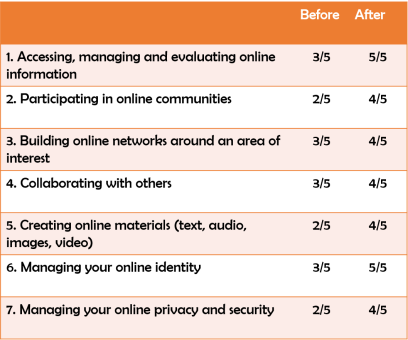
I’ve gained more confidence in handling each factor. As we all know facts about digital footprints, I’ve become more cautious of what information I put online. I plan to further improve myself in managing my privacy and security as technology get more advanced everyday. Learning more to help my development of my professional profile in the long-run, example through online tutorials/courses.
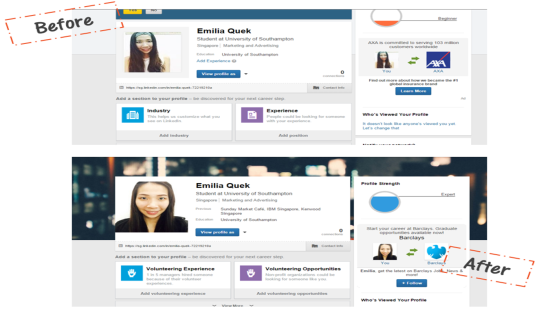
How my profile rating increase when i first created and now
Set up my LinkedIn account and further develop my twitter and WordPress to be more professional. Chose to have 2 different photos for different platforms as I want to show my separation of business and personal use (Ina O’Murchu, 2004). Followed groups with my LinkedIn account to keep updated of their news and activities which I can participate to widen my social network (De Valck, 2009). Locally and globally.
Twitter to keep myself updated with the latest business news and also to do personal branding. Interacting with other marketers to learn from their experiences and gain more business knowledge.
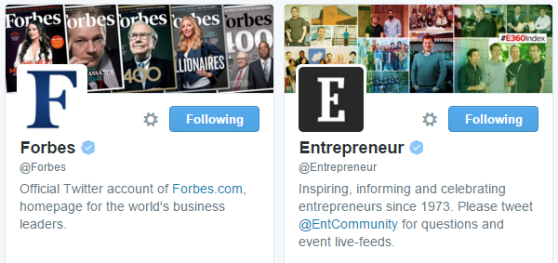
Following shows my progress (online digital professional profile) during this module.
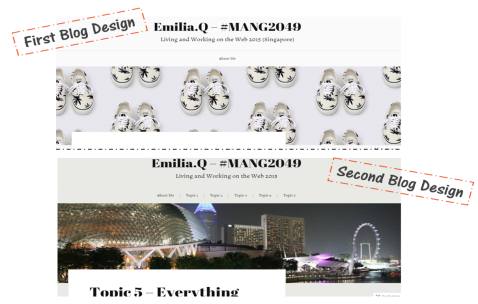
My blog theme was in constant change as i want to make it more professional and relevant (eg: images) and the current theme is my final one.
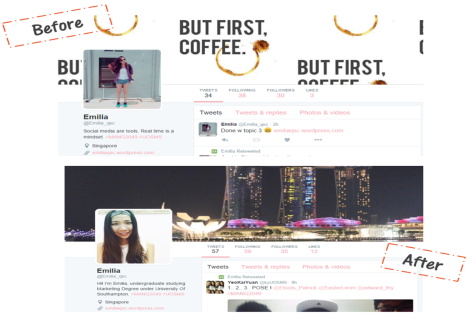
Changed in display picture and cover photo. Profile description changed to be more professional.
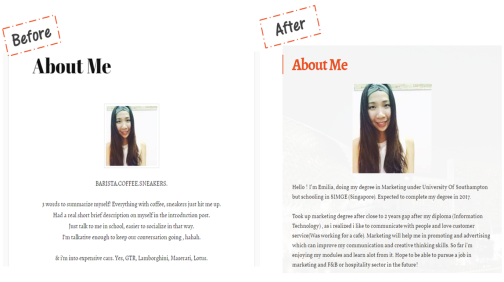
Changed my profile description to a more professional way in introducing myself online
Besides the mentioned social media platforms I’m developing on, I planned to join other platforms to have more opportunities to collaborate and interact with other communities (Ballantine & Martin, 2005). Some countries have blocked certain platforms, i do not want to miss out on building connections (right guys???).
I’ve changed my future learning approach(es) on using online resources for my extra-readings, enhancing my learning experience for future modules. Example, creating e-learning blog/platforms to share my knowledge and at the same time allow others to comment/suggest on my posts to gain more knowledge (Yang S.H, 2009).
I see myself slowly changing and widening my online (business) perspective. And my digital literacy level have improved! Main Take-Away: Constant reminder to myself to be ethical when posting (know your objectives), be responsible (relevant/irrelevant) of what you post and always think twice before posting.
Links to my social media platforms, feel free to follow!
References
Teo, T. S. (2001). Demographic and motivation variables associated with Internet usage activities. Internet Research, 11(2), 125-137.
http://bschool.nus.edu/staff/bizteosh/Teo2001DemoInternet.pdf
Lennon, R., Rentfro, R. W., & Curran, J. M. (2012). Exploring relationships between demographic variables and social networking use. Journal of Management and Marketing Research, 11, 1-16.
http://www.aabri.com/manuscripts/121164.pdf
O’Murchu, I., Breslin, J. G., & Decker, S. (2004, August). Online Social and Business Networking Communities. In ECAI Workshop on Application of Semantic Web Technologies to Web Communities (Vol. 107).
http://www.deri.ie/fileadmin/documents/DERI-TR-2004-08-11.pdf
De Valck, K., Van Bruggen, G. H., & Wierenga, B. (2009). Virtual communities: A marketing perspective. Decision Support Systems, 47(3), 185-203.
http://www.researchgate.net/profile/Kristine_Valck/publication/222905889_Virtual_communities_A_marketing_perspective/links/5417503e0cf2f48c74a40682.pdf
Paul W. Ballantine and Brett A. S. Martin (2005) ,”Forming Parasocial Relationships in Online Communities”, in NA – Advances
in Consumer Research Volume 32, eds. Geeta Menon and Akshay R. Rao, Duluth, MN : Association for Consumer Research, Pages: 197-201
http://www.acrwebsite.org/volumes/9073/volumes/v32/NA-32
Yang, S. H. (2009). Using blogs to enhance critical reflection and community of practice. Journal of Educational Technology & Society, 12(2), 11-21
http://www.ifets.info/journals/12_2/2.pdf
Social Media Changing the Competitive Intelligence Process: Elicitation of Employees’ Competitive Knowledge
Available on: http://dspace.cc.tut.fi/dpub/bitstream/handle/123456789/20724/vuori.pdf
[Accessed on 17 November 2015]
Social Media Factors Affecting Business
Available on: http://pestleanalysis.com/social-factors-affecting-business/
[Accessed on 17 November 2015]
Digital Footprints
Available on: http://www.internetsociety.org/sites/default/files/Digital%20Footprints%20-%20An%20Internet%20Society%20Reference%20Framework.pdf
[Accessed on 17 November 2015]
How To Suck At Social Media: An Indispensable Guide For Businesses (image)
Available on: http://www.kaushik.net/avinash/social-media-marketing-success-guide-businesses/
[Accessed on 17 November 2015]
Which Social Networks Do People Trust the Most? (image)
Available on: http://www.socialmediatoday.com/social-networks/sarah-snow/2015-09-15/which-social-networks-do-people-trust-most
[Accessed on 17 November 2015]
Why You Should Separate Your Personal & Business Social Media!
Available on: http://designrfix.com/social-media/separate-personal-social-media-business
[Accessed on 18 November 2015]
7 Great Personal Branding Tools to Improve Your Online Presence
Available on: http://www.business2community.com/branding/7-great-personal-branding-tools-improve-online-presence-0768470#qkRat8X7GUZXGo80.99
[Accessed on 18 November 2015]
North Korea, Iran, China, Pakistan, Turkey – Countries Who Block Social Media [INFOGRAPHIC]
Available on: http://www.adweek.com/socialtimes/countries-social-media-banned/500519
[Accessed on 19 November 2015]
Cyber Security & Privacy Foundation Pte Ltd
Available on: https://www.udemy.com/u/jprasanna/
[Accessed on 19 November 2015]







